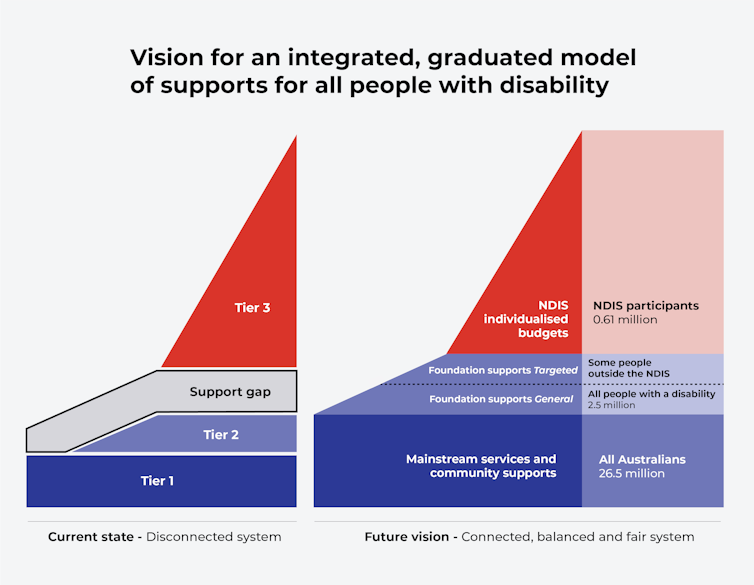Source: The Conversation (Au and NZ) – By Helen Dickinson, Professor, Public Service Research, UNSW Sydney

On Monday evening Australia’s state premiers and territory chief ministers got together and called on the federal government to delay or amend draft laws to overhaul the National Disability Insurance Scheme (NDIS). The laws are to determine how states provide “foundational supports”, a key recommendation of the NDIS Review.
There was a sense of optimism in December when National Cabinet agreed the states and Commonwealth would split the funding of foundational supports and the Commonwealth would add billions to strengthen Medicare. This was meant to ease the costs of specialist support within the NDIS.
So why are the details proving controversial now? And does the backlash mean NDIS reforms might fall over at the first hurdle?
Creating other avenues of support
Last year’s NDIS Review was tasked, among other things, with considering the financial sustainability of the scheme.
The review argued there is no single issue driving the growing cost pressure of the NDIS. But the lack of accessible and inclusive mainstream services for people with disability was pushing them into the NDIS. This means more people are on the scheme than was originally intended.
Read more:
Recommendations to reboot the NDIS have finally been released. 5 experts react
We have seen particular growth in the number of young people with autism and developmental delay entering the NDIS. One in ten boys aged between five and seven have an NDIS plan when starting school.
While this could indicate the original scheme estimates were not correct, it’s likely a significant proportion of demand is being driven by a lack of other available supports through mainstream services.
Supports the states used to provide
The NDIS was never intended to provide services to all people with disability and about 86% of disabled Australians do not have NDIS plans. Those without NDIS plans access the same mainstream services as the rest of the population – be they schools, health services or public transport.
But mainstream services are not always accessible to people with disability. Research from the University of Melbourne in 2022 shows the vast majority of Australians with disability who don’t have NDIS plans can’t access the services and supports they need. When this happens people have to go without or pay for additional supports such as taxis, mobility equipment or domestic assistance themselves.
Since the establishment of the NDIS over a decade ago, states and territories have pulled back from providing some services for people with disability.
Home and community care programs to support people under 65 years of age with less intensive disability needs, for example, are inconsistent and underfunded in many places. So if a person with disability needs help with some shopping or cleaning, their only option for support may well be to apply to join the NDIS.

NDIS Review, CC BY-SA
Are these reforms a surprise?
The NDIS Review acknowledges the scale of reform outlined in its recommendations are significant and should be transitioned to over a five-year period. But many of the changes that will take place within the NDIS are dependent on having foundational services in place outside the scheme. Foundational supports are a key priority in the reform process.
The development of a foundational supports strategy should not have taken states and territories by surprise. The day before the NDIS Review was launched in December, National Cabinet reached its decision to share foundational support costs equally between the Commonwealth and states and territories. And at the end of January, the Commonwealth committed A$11.6 million over two years to support the development and implementation of the foundational supports strategy.
Although fresh reports say state and territory leaders fear “uncosted” foundational supports, premiers were reportedly given an indication of additional costs at the December National Cabinet meeting.
Since then, state and territory governments will have been working to determine exactly what foundational services are needed in their jurisdictions and how many people might want to access these. Given the NDIS Review recommended better and more detailed data collection, many of these governments likely don’t have good enough data to easily understand what the demand for these services might be and therefore what they might cost.
While states and territories appear to have signed up to the general direction of reform, the latest reports suggest premiers are concerned at the speed and the scale of the changes. In a context of tight state budgets there are likely also fears of extra budgetary pressures from developing new systems of support.
Read more:
There is overwhelming gender bias in the NDIS – and the review doesn’t address it
Future disability reform
Debates over which parts of government should fund which services are not new. But focusing on who pays for what misses the bigger picture.
Getting a system of foundational supports in place is essential not only for the sustainability of the NDIS but also for all those disabled Australians who are currently going without necessary supports to live their lives. As a signatory to the United Nations Convention on the Rights of Persons with Disability, Australia has a commitment to protect the rights of people with disabilities and ensure their full inclusion in society.
The NDIS is one part of realising this commitment, but it will not be able to achieve this on its own. If they can’t access mainstream services, disabled people are shut out from participation in aspects of daily life we should all be able to take for granted.
Disability advocates argue delaying tactics from states and territories are unacceptable and reform needs to happen now. The federal government seems committed to the top recommendation of the NDIS Review. It remains to be seen whether the states and territories are ready to move at the same pace.
![]()
Helen Dickinson receives funding from ARC, NHMRC and CYDA.
– ref. States agreed to share foundational support costs. So why the backlash against NDIS reforms now? – https://theconversation.com/states-agreed-to-share-foundational-support-costs-so-why-the-backlash-against-ndis-reforms-now-226620







